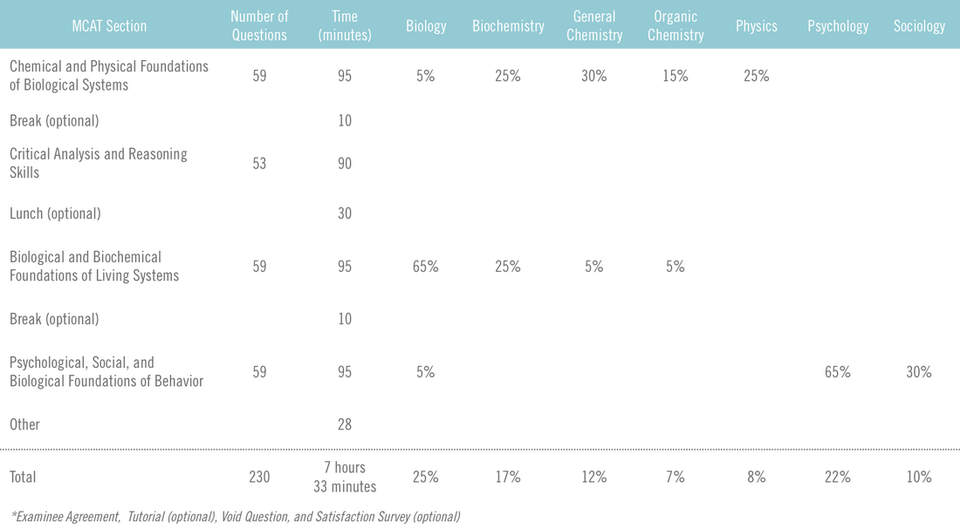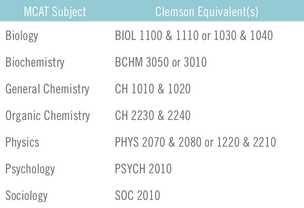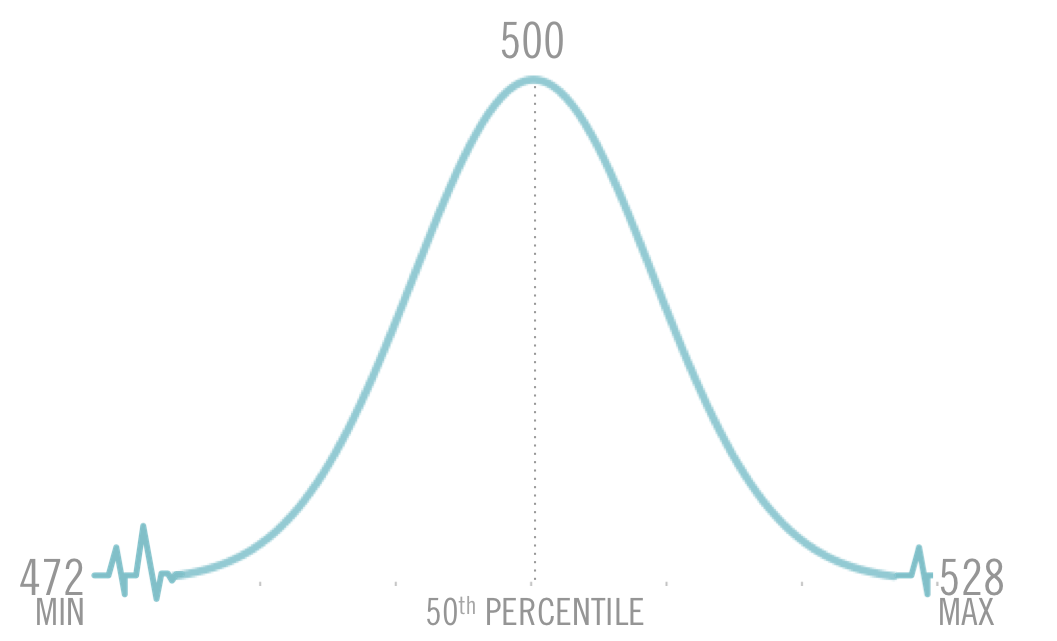The Medical College Admissions Test (MCAT) is the standardized test mandatory for all traditional allopathic and osteopathic medical schools. It is also recommended for some PA programs. Provided by the Association of American Medical Colleges (AAMC), the MCAT helps admissions committees compare students by a single metric. Furthermore, in the past, particular MCAT scores have correlated with passing medical licensing exams like USMLE (United States Medical Licensing Examination).
Although it may seem intimidating, the MCAT is certainly manageable if you know how to prepare.
Although it may seem intimidating, the MCAT is certainly manageable if you know how to prepare.
What is on the MCAT?
The MCAT is a 7 hour 30 minute standardized, multiple choice exam designed to not only test your knowledge, but also your ability to apply the knowledge in various situations. Questions are mainly passage-based with 5-7 questions following each passage. The exam occurs in the following order and is broken down as follows:
As you may be able to tell, the MCAT is heavy on science, which is why many students that apply to medical school are science majors. For a full breakdown of exact content, click here.
When should I take it?
The most common advice is to take the MCAT when you have taken all of the courses that will be on the MCAT. The absolute last date to take the MCAT is the summer you apply to medical school - for those not taking a gap year, this is the summer after your junior year. You need the results of your score to be available by the submission deadline (read more here). The most common time to take the examination is in the spring of your junior year or the early summer after your junior year.
If you want to have the option to take the exam at least twice, then you should take your first MCAT no later than April (maybe May) when you're applying to medical school. That way you could take another exam in June. Keep in mind you will not know what you made on the exam immediately, and you typically have to wait a month for results.
Basically, take the exam when you are ready, but keep in mind submission deadlines. We advise taking it as early as possible when you've taken all the courses necessary to prepare.
If you want to have the option to take the exam at least twice, then you should take your first MCAT no later than April (maybe May) when you're applying to medical school. That way you could take another exam in June. Keep in mind you will not know what you made on the exam immediately, and you typically have to wait a month for results.
Basically, take the exam when you are ready, but keep in mind submission deadlines. We advise taking it as early as possible when you've taken all the courses necessary to prepare.
How To Prepare
|
Clemson Courses
First, we advise taking the courses on the MCAT at Clemson, even if you have credit for these courses from high school. Depending on your major, you may take many of the courses (to the right) while you are completing your major requirements. We strongly recommend taking these prerequisites before taking the MCAT. While these courses will surely help you to ace the MCAT, you should review these courses before taking the exam, which leads us into our next topic - extracurricular preparation. |
Extracurricular Preparation
No matter how you choose to study, you still must study quite a bit. Many members that perform exceptionally well put in between 100-300 hours to study for the MCAT. This is the biggest test you have taken in your life at this point, so be encouraged by the challenge and prepare yourself by studying specifically for the MCAT.
There are a LOT of test prep companies out there. Keep in mind, no matter how much money you spend on test prep, in the end, you will have to study. We do not endorse any particular company, but many of our successful members tend to stick with popular companies (Kaplan, ExamKrackers, etc.) and perform exceptionally well. In the end, only you know how you study best. We strongly recommend purchasing some kind of review books.
No matter how you choose to study, you still must study quite a bit. Many members that perform exceptionally well put in between 100-300 hours to study for the MCAT. This is the biggest test you have taken in your life at this point, so be encouraged by the challenge and prepare yourself by studying specifically for the MCAT.
There are a LOT of test prep companies out there. Keep in mind, no matter how much money you spend on test prep, in the end, you will have to study. We do not endorse any particular company, but many of our successful members tend to stick with popular companies (Kaplan, ExamKrackers, etc.) and perform exceptionally well. In the end, only you know how you study best. We strongly recommend purchasing some kind of review books.
Self-Study
If you are driven and can set aside time to study productively, then we think self-study can suffice. However, in studying for an exam this large, it is easy to study the things you know well and leave the things that you do not know for later. Make sure to honestly address your weak points when self-studying. Using review books and practice exams are the best way to track your progress!
Review Courses
If you struggle to hold yourself accountable to a study schedule, then a course can keep you on track. Online or in-person courses often have study schedules available to ensure you hit each of the major topics you need. Review courses also have extra resources including additional test questions, testing analyses, online live chats, and more. These resources may be helpful if you feel review books and tests are not enough.
If you are trying to conserve money then you need to plan ahead. Try the self-study plan for your first MCAT, and if you do not perform your best, then try a course.
If you are driven and can set aside time to study productively, then we think self-study can suffice. However, in studying for an exam this large, it is easy to study the things you know well and leave the things that you do not know for later. Make sure to honestly address your weak points when self-studying. Using review books and practice exams are the best way to track your progress!
Review Courses
If you struggle to hold yourself accountable to a study schedule, then a course can keep you on track. Online or in-person courses often have study schedules available to ensure you hit each of the major topics you need. Review courses also have extra resources including additional test questions, testing analyses, online live chats, and more. These resources may be helpful if you feel review books and tests are not enough.
If you are trying to conserve money then you need to plan ahead. Try the self-study plan for your first MCAT, and if you do not perform your best, then try a course.
|
Tried and true, this test prep king harbors various forms of test preparation. Many of our members use solely Kaplan to study. Kaplan courses include - prices may vary. All courses come with 17 full-length exams, over 10,000+ MCAT practice items, and the most available official AAMC practice resources. Please note that Clemson AED members receive 15% off of Kaplan courses. Contact us to receive the discount.
Kaplan self-study offers stand alone review books + 3 practice tests ($196). Looking to get started right away? Try their MCAT Question of the Day (Free), which gets sent to you via email daily. If you've got a little more time on your hands work in Kaplan's 20-Minute Workout (Free). Khan Academy
The AAMC has partnered with Khan academy to create the Khan Academy MCAT Video Collection, which covers all the content that will be tested on the MCAT. With more than 900 free videos & 2,000 review questions is an excellent resource for explanations on topics you might not quite get. Great all-around, but superb as an additional resource for self-study.
The Princeton Review
Another Test Prep giant, The Princeton Review offers MCAT Bootcamp ($7,052), MCAT 513+ ($2,899), Live-Online ($1,999), and many more!
*AED members now get 15% off for Princeton Review materials. Contact us at [email protected] for more information. Gold Standard MCAT
Gold Standard MCAT is dedicated to helping students excel in their Medical College Admission Test (MCAT) preparation. Thousands of students across the US have trusted their comprehensive study materials and online resources for over 30 years. Their MCAT prep courses include the MCAT Crash Course, priced at $49.95/month, and the Home Study Package, available at $799.
|
Practice Tests
Kaplan (Free)
The Princeton Review (Free) AAMC Scored Practice Exam ($35) AAMC Question Packs ($15) AAMC Official Prep Bundle ($268) Gold Standard Practice Tests (2 for $70, 7 for $150, 12 for $799) Daily Questions
|
Scoring
|
Each section of the MCAT is scored from a low of 118 to a high of 132. Considering there are four sections, that means scores range from 472 to 528 with 500 in the middle. Scoring is "normalized"; therefore, a score of 502 means you are in the 51th percentile. For a detailed explanation of scoring, click here.
For a frame of reference, these are the median MCAT scores for South Carolina medical schools: Allopathic Schools USC-Greenville: 509 USC-Columbia: 508 MUSC: 511 Osteopathic Schools VCOM-Spartanburg: 500-506 Last Updated: June 2023 |
MCAT® is a registered trademark of the AAMC, which does not endorse the contents of this website.
All pricing is subject to change.
All pricing is subject to change.




